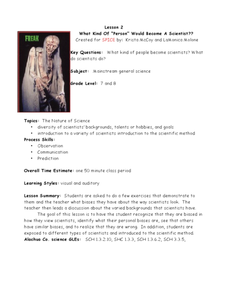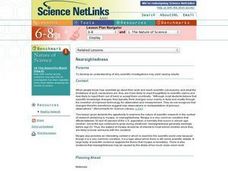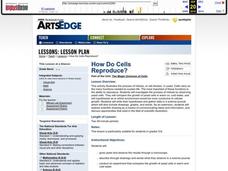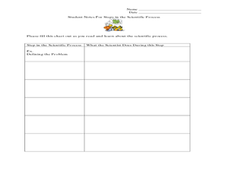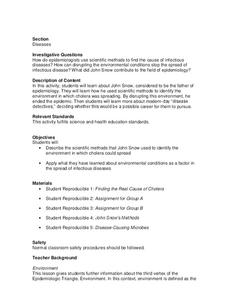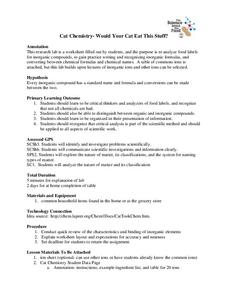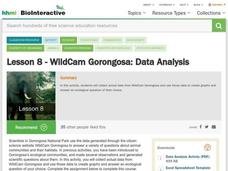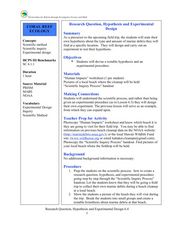Curated OER
What Kind of "Person" Would Become a Scientist?
"Scientist Stereotypes" could be another name for this lesson! Begin by drawing from middle schoolers' preconceived notions and media portrayal of scientists, and then explain that anyone can be a scientist. Even though there is an...
Curated OER
Nearsightedness
Examine the processes scientists go through to develop their conclusions. Using the internet, research the problem of nearsightedness and identify anyone they know with the condition. Discover the debate in the science world on this...
The New York Times
Laboratory Experiment
For any science class, learners can use this lab sheet to plan an experiment. It includes a space for the title, question, materials, setup, and procedure. If you want your class to complete this in typed form, you can provide the web...
Curated OER
How Do Cells Reproduce?
Beginning biologists prepare a sugar solution for yeast cells to live in, and divide it into two different jars. Samples from each jar are viewed with a microscope, and then one jar is placed in a warm environment and the other a cold...
Curated OER
Snow Goggles
Pupils assemble snow goggle models and discuss how snow goggles change the amount of light shining in their eyes.
Curated OER
Why did the can crush?
Students watch a demonstration to ascertain why a soda can crushed. They make observations and hypothesize about why a soda can crushed and relate the difference in pressure to its affect on objects around us (soda can). Explanation is...
Curated OER
Investigating Brass Instruments and Pitch
Students observe the sounds of different brass instruments in order to understand how to create different pitches. In this musical instructional activity, students create a "brass" instrument from everyday household objects. The students...
Curated OER
Food for Spaceflight
When astronauts get hungry in outer space, they can't just call and have a pizza delivered. In order to gain an appreciation for the challenges associated with space travel, young learners are given the task of selecting,...
Baylor College
Heart Rate and Exercise
What is the relationship among the heart, circulation, and exercise? Your class members will explore first-hand how different physical exercises affect an individual's heart rate. They will begin by learning how to measure their own...
Curated OER
Apply Scientific Inquiry and Scientific Habits of Mind
Students review the components of the scientific inquiry method. In groups, they apply this method to various experiments they are given to complete. They also use the correct scientific habits of mind when researching different concepts.
Curated OER
Apply Scientific Inquiry and Scientific Habits of Mind
Students review the components of the scientific inquiry method. In groups, they develop hypothesis on a variety of different topics and design an investigation or experiment to test it. They share their conclusions with the class and...
Curated OER
Student Notes for Steps in the Scientific Process
In this science inquiry skills worksheet, students fill out a blank chart as they read and learn about the scientific process. The chart has two columns with the titles, "Step in the Scientific Process" and "What the Scientist Does...
Curated OER
Learning Scientific Coral Terminology
Students explore properties of coral. In this scientific observation lesson, students investigate properties and characteristics of coral. Students write statements describing the coral using observation words.
Curated OER
Scientific Inquiry Post-Test
In this scientific inquiry post-test worksheet, students complete a 7 question matching activity that uses vocabulary associated with the inquiry process. They answer 2 multiple choice questions about independent and dependent variables.
Centers for Disease Control and Prevention
Diseases
During a cholera outbreak, scientists presented two theories; one theory was based on miasma and the other on germs and contaminated water. The lesson looks at the scientific process for finding the real culprit.
IB Psychology
Key Terms Traffic Lights
How much does your class know about psychology? What about empirical evidence? If they could use some time to learn the essentials of psychology, use a quick reference sheet to note what they know before the test, after the unit, and at...
University of Georgia
Would Your Cat Eat This Stuff?
Processed foods use inorganic compounds for flavoring and preservation. This take-home laboratory challenges scholars to find 20 different compounds identified on the labels of foods to list on their data collection sheet. The activity...
Curated OER
Peanut Processes
Students use the senses are to make observations about phenomena. They use a peanut and its shell as the object of a series of observations. In addition, they complete a drawing with their written observations to use as a guide to choose...
Novelinks
The Crucible: Questioning Strategies Bloom's Taxonomy
Enrich your unit on Arthur Miller's The Crucible with a list of reading questions based on Bloom's Taxonomy. Kids answer questions and provide context for the knowledge, comprehension, application, analysis, synthesis, and...
Curated OER
Eggs'ceptional Experiments
Students see evidence of chemical reaction and follow the scientific method to hypothesize, observe, and reach conclusions. They conduct a series of egg based experiments such as forming crystals and complete journal activities as a...
University of Minnesota
Dendritic Spines Lab
This is your brain on drugs ... literally! Your neuroscientists-in-training examine the evidence of drug use on the human brain and how neurons change their connectivity when altered by drugs. They then work together to create testing...
Howard Hughes Medical Institute
Lesson 8: WildCam Gorongosa Data Analysis
How do scientists analyze data to get a specific answer to a question? The final chapter in an eight-part series of activities centered around Gorongosa National Park encourages scholars to dig deeper into the scientific process. After...
NASA
Let's Investigate Mars
Take your science class on a hypothetical field trip to Mars with an engaging astronomy lesson. After first learning about NASA's Mars rover missions, young scientists plan their own scientific investigations of Earth's...
Curated OER
Research Question, Hypothesis and Experimental Design
Learners discuss steps of the scientific process, as well as, observe a picture of the beach that they will visit. Students create a testable hypothesis about marine debris at the beach. In this science lesson, learners create a...
